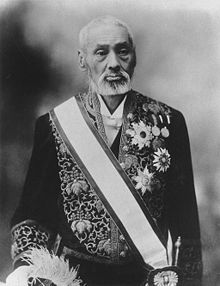Katō Hiroyuki
Kato Hiroyuki ( Japanese 加藤弘之 ; 5. August 1836 in Izushi , district Izushi , Tajima Province (today Prefecture of Hyogo ); † 9. February 1916 in Tokyo , 1900 Baron ) was a Japanese constitutional law scholar and politician of the Meiji period .
life and work
Katō, born the son of a samurai and instructor in the military in Izushi in the province of Tajima , studied western science and the military at an early age. Since one separated from the family tradition of the Kōshū style of military training in, Katō learned at the Han School Kōdōkan ( 弘道 館 ) and then went to Edo. There he switched to Western science under Sakuma Shōzan , who was also not satisfied with traditional military training.
In 1860 Katō was teaching assistant at the Bansho Shirabesho ( 蕃 書 調 所 ), where he switched from military science to political science, learned German and was one of the first in Japan to study German philosophy . Just one year later he published the work with the harmless title “Grasses next door” ( 隣 草 , Tonari-gusa ) first ideas for a state constitution, in which he emphasized the need for a parliament. After the Meiji Restoration , he published " Basic Thoughts on True Government" ( 真 政 大意 , Shinsei taii ) in 1870 , "New Ideas on the State Body" ( 国体 新 論 , Kokutai shinron ) and other works in 1875 to advance the idea of a constitution. He was also active within the Meirokusha , an association of politicians and scholars who had dedicated themselves to the Enlightenment ( 啓蒙 , keimō ).
In 1877 Katō became the first president of the newly founded University of Tokyo , increasingly advocating the idea of evolution. In the work “New Declaration of Human Rights” ( 人 権 新 説 , Jinken shinsetsu ; 1882) , he criticized the human rights teaching that appealed to heaven (God). At that time this led to disputes with the "Democratic Civil Rights Movement" ( 自由民 権 派 , Jiyū minken-ha ).
Later Katō u. a. Member of the Senate , the Manor House , the Privy Council of State , President of the Imperial Academy , published the private magazine “On the Side of Heaven” ( 天 側 , Tenzoku ) and continued to advocate the ideas of Social Darwinism . So appeared in 1893 "Disputes about the law of the strong" ( 強者 の 権 利 の 競争 , Kyōsha no kenri no kyōso ) and 1900 “Theory of the further development of moral legislation” ( 道 徳 法律 進化 の 理 , Dōtoku hōritsu shinka no ri ).
Katō took his final standpoint in the work "Nature and Theory" ( 自然 と 論理 , Shizen to ronri ) as the philosophical basis for the work of the government of the Meiji period.
Remarks
- ↑ Kōshū Ryu ungaku ( 甲州流軍学 ), from the Takeda maintained military training.
- ^ Establishment of the shogunate for the study of Western literature. One of the forerunners of Tokyo University. Also written 蛮 書 調 所 at the same reading .
literature
- Toshihiko Suzuki (Ed.): Kato Hiroyuki in: NIhon daihyakka zensho (Denshibukku-han) , Shogakukan, 1996.
- Jane Hunter: Kato Hiroyuki in: Concise Dictionary of Modern Japanese History. Kodansha International, Tokyo 1984, ISBN 4-7700-1193-8 .
Web links
| personal data | |
|---|---|
| SURNAME | Katō, Hiroyuki |
| ALTERNATIVE NAMES | 加藤 弘 之 (Japanese) |
| BRIEF DESCRIPTION | Japanese scholar and politician |
| DATE OF BIRTH | August 5, 1836 |
| PLACE OF BIRTH | Izushi , district Izushi , Tajima Province (today Prefecture of Hyogo ) |
| DATE OF DEATH | February 9, 1916 |
| Place of death | Tokyo |
